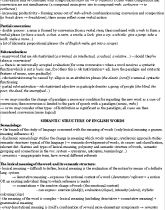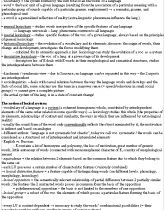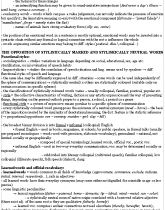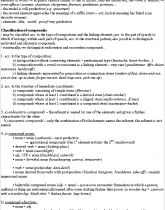Studijní materiál: English Lexicology
Skrýt detaily | Oblíbený- Kvalita:79,7 %
- Typ:Studijní materiál
- Univerzita:Univerzita Karlova v Praze
- Fakulta:Filozofická fakulta
- Kategorie:Jazyky
- Podkategorie:Angličtina
- Předmět:Anglická lexikologie
- Autor:eliskabila
- Rozsah A4:25 strán
- Zobrazeno:1 304 x
- Stažené:0 x
- Velikost:0,2 MB
- Formát a přípona:MS Office Word (.doc)
- Jazyk:anglický
- ID projektu:2464
- Poslední úprava:06.12.2013
The object of lexicology:
- lexicology = lexis (word) + logos (learning)
- lexicology – the part of linguistics dealing with the vocabulary and the properties of words as the main units of language
- vocabulary = the system formed by the sum total of all the words of a language
- word = the basic unit of a given language (resulting from the association of a particular meaning with a particular group of sounds capable of a particular gramm. employment) → a semantic, gramm. and phonological unit
- a word is a generalized reflection of reality (extra-linguistic phenomena influence the lang.)
• general lexicology – studies words irrespective of the specific features of any language
→ language universals – lang. phenomena common to all languages
• special lexicology – studies specific features of the voc. of a given language; always based on the principles of general lexicology
• historical lexicology – the evolution of a vocabulary and its elements; discusses the origin of words, their change and development, investigates the forces modifying them
- criticized for its atomistic approach x hist. lexicology can study the evolution of a voc. as a system
• descriptive lexicology – the voc. of a lang. at a given stage of its development
- descriptive lex. of E deals with E words in their morphological and semantical structures, studies the interdependence between them
- diachronic / synchronic view – due to Saussure; no language can be separated in this way – the 2 aspects are interdependent
• sociolinguistics – deals with casual relations between the way the language works and develops and the facts of social life; some scholars use this term in a narrower sense (= speech behaviour in small social groups) → cannot give a complete picture
- the actual system of the lang. is in a state of constant change!
The notion of lexical system:
- vocabulary of a language is a system (a coherent homogenous whole, constituted by interdependent elements of the same order related in some specific ways) → lexicology studies this whole (the properties of its elements, relationships of contrast and similarity, the ways in which they are influenced by extra-lingual reality)
- usually the sound form of the word only conventionally reflects the object nominated by it; the motivation is indirect and based on analogies
- different authors: ‘language is not systematic but chaotic’; today we call voc. systematic / the words can be considered as a structured set of interdependent and interrelated elements
- English vs. Russian:
- E contains a lot of homonyms and polysemy, the loss of motivation, great number of generic words, little autonomy of words (connected with monomorphemic character of E, scarcity of morphological means)
- equivalence = the relation between 2 elements based on the common feature due to which they belong to the same set
- each LU possesses a certain number of characteristic features (variously combined)
→ lexical distinctive feature = a feature capable of distinguishing words (on different levels: phonology, morphology, lexicology)
- lexical opposition = the semantically relevant relationship of partial difference between 2 partially similar words; the features the 2 contrasted words posses in common form the basis of the opposition
• polydimensional opposition – the basis is not limited to the members of one opposition
- lexical group = a subset of the voc. the elements of which posses a particular feature forming the basis of the opposition
- lexicology = lexis (word) + logos (learning)
- lexicology – the part of linguistics dealing with the vocabulary and the properties of words as the main units of language
- vocabulary = the system formed by the sum total of all the words of a language
- word = the basic unit of a given language (resulting from the association of a particular meaning with a particular group of sounds capable of a particular gramm. employment) → a semantic, gramm. and phonological unit
- a word is a generalized reflection of reality (extra-linguistic phenomena influence the lang.)
• general lexicology – studies words irrespective of the specific features of any language
→ language universals – lang. phenomena common to all languages
• special lexicology – studies specific features of the voc. of a given language; always based on the principles of general lexicology
• historical lexicology – the evolution of a vocabulary and its elements; discusses the origin of words, their change and development, investigates the forces modifying them
- criticized for its atomistic approach x hist. lexicology can study the evolution of a voc. as a system
• descriptive lexicology – the voc. of a lang. at a given stage of its development
- descriptive lex. of E deals with E words in their morphological and semantical structures, studies the interdependence between them
- diachronic / synchronic view – due to Saussure; no language can be separated in this way – the 2 aspects are interdependent
• sociolinguistics – deals with casual relations between the way the language works and develops and the facts of social life; some scholars use this term in a narrower sense (= speech behaviour in small social groups) → cannot give a complete picture
- the actual system of the lang. is in a state of constant change!
The notion of lexical system:
- vocabulary of a language is a system (a coherent homogenous whole, constituted by interdependent elements of the same order related in some specific ways) → lexicology studies this whole (the properties of its elements, relationships of contrast and similarity, the ways in which they are influenced by extra-lingual reality)
- usually the sound form of the word only conventionally reflects the object nominated by it; the motivation is indirect and based on analogies
- different authors: ‘language is not systematic but chaotic’; today we call voc. systematic / the words can be considered as a structured set of interdependent and interrelated elements
- English vs. Russian:
- E contains a lot of homonyms and polysemy, the loss of motivation, great number of generic words, little autonomy of words (connected with monomorphemic character of E, scarcity of morphological means)
- equivalence = the relation between 2 elements based on the common feature due to which they belong to the same set
- each LU possesses a certain number of characteristic features (variously combined)
→ lexical distinctive feature = a feature capable of distinguishing words (on different levels: phonology, morphology, lexicology)
- lexical opposition = the semantically relevant relationship of partial difference between 2 partially similar words; the features the 2 contrasted words posses in common form the basis of the opposition
• polydimensional opposition – the basis is not limited to the members of one opposition
- lexical group = a subset of the voc. the elements of which posses a particular feature forming the basis of the opposition




